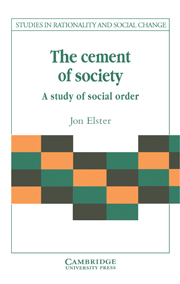Book contents
Introduction: the two problems of social order
Published online by Cambridge University Press: 09 January 2010
Summary
Hume wrote, in the abstract to the Treatise of Human Nature, that causality is the ‘cement of the universe’. What ensures order in the physical world is that events of one type invariably follow upon events of another type. In this book, I discuss the conditions for order in the social world. What is it that glues societies together and prevents them from disintegrating into chaos and war? It is a big problem, second to none in importance. I do not claim to provide a complete answer, nor are the partial answers I offer very deep ones. At the present time, the social sciences cannot aspire to be more than social chemistry: inductive generalizations that stick closely to the phenomena. The time for social physics is not yet here, and may never come.
I shall discuss two concepts of social order: that of stable, regular, predictable patterns of behaviour and that of cooperative behaviour. Correspondingly, there are two concepts of disorder. The first, disorder as lack of predictability, is expressed in Macbeth's vision of life as ‘sound and fury, a tale told by an idiot, signifying nothing’. The second, disorder as absence of cooperation, is expressed in Hobbes's vision of life in the state of nature as ‘solitary, poor, nasty, brutish, and short’. Instead of referring to predictability and cooperation, economists talk about equilibrium and Pareto optimality. For reasons that will emerge later, I do not adopt this terminology. In Chapter 3 I argue that social norms ensure predictability outside equilibrium and in Chapter 5 that cooperation can lead to Paretoinferior outcomes.
- Type
- Chapter
- Information
- The Cement of SocietyA Survey of Social Order, pp. 1 - 16Publisher: Cambridge University PressPrint publication year: 1989
- 1
- Cited by

